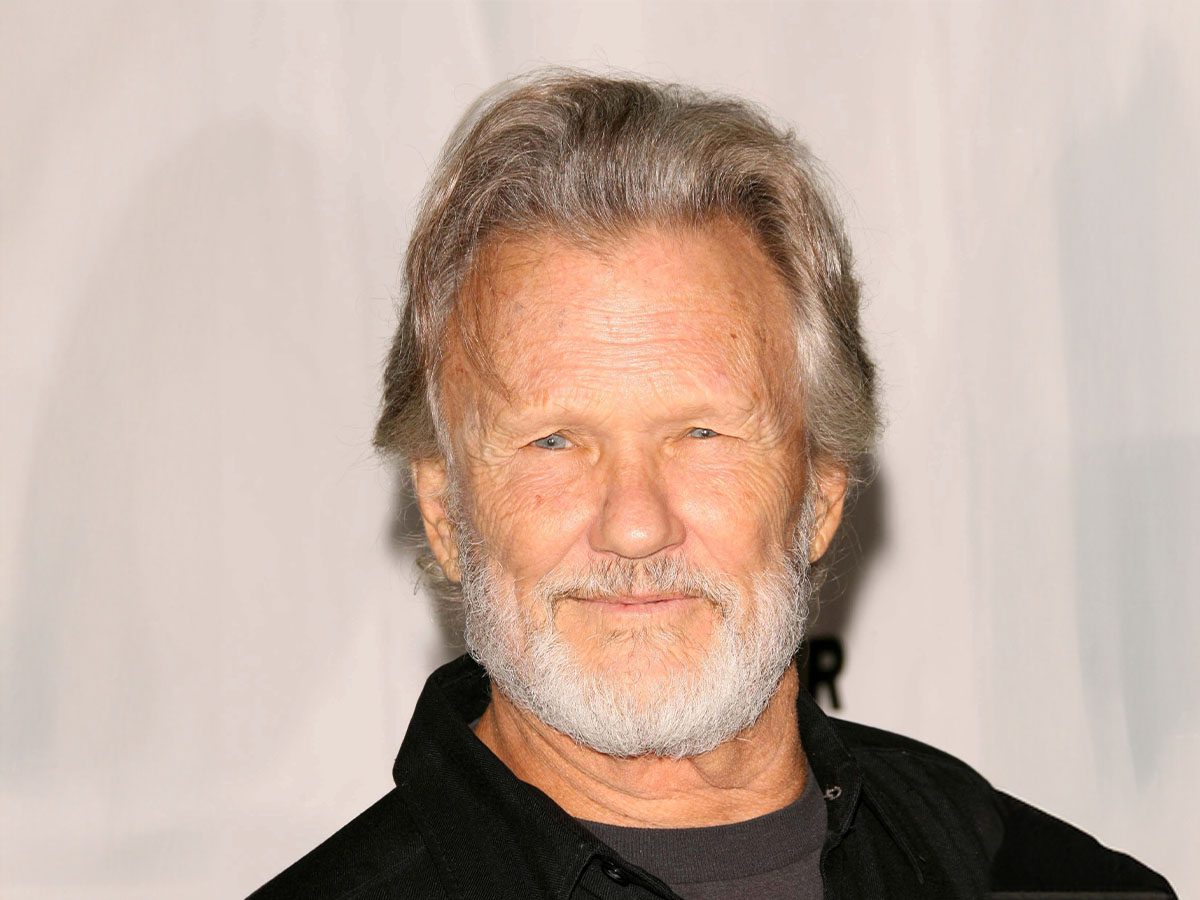
The world mourns the loss of Kris Kristofferson, an iconic figure in country music and film. He passed away at the age of 88, surrounded by his loved ones, at his home in Maui, Hawaii. His family confirmed the news in a heartfelt message: “We’re all so blessed for our time with him. Thank you for loving him all these many years, and when you see a rainbow, know he’s smiling down at us all.”
While no cause of death was given, Kris Kristofferson’s legacy is undeniable. As a singer-songwriter, he redefined the sound and meaning of country music, penning timeless songs such as “Me and Bobby McGee” and “Sunday Morning Coming Down.” His profound lyrics touched the souls of millions, and his music continues to inspire countless artists and listeners around the globe.
Born on June 22, 1936, in Brownsville, Texas, Kristofferson’s path to stardom was anything but ordinary. Raised in a military family, his father, a U.S. Air Force major general, pushed him to follow in his footsteps. Kris excelled academically, earning a Rhodes Scholarship to study literature at Oxford University. During his time there, he not only gained intellectual accolades but also distinguished himself in boxing and rugby.
However, the call of music was always stronger than military tradition. After serving in the U.S. Army, achieving the rank of captain, and completing Ranger School, Kristofferson made a bold decision to leave a prestigious teaching post at West Point to pursue a career in songwriting. He famously said that teaching literature at West Point “sounded like hell” to him. Instead, he worked as a janitor and commercial helicopter pilot in Nashville, all while dreaming of making it big in the music industry.
Kristofferson’s determination paid off when he crossed paths with Johnny Cash. The country music legend initially paid little attention to him, but Kristofferson’s persistence, including landing a helicopter in Cash’s yard to deliver his demo tape, eventually got Cash’s attention. Cash went on to record “Sunday Morning Coming Down”, a song that would define both their careers. This track was later voted Song of the Year by the Country Music Association in 1970.
Kristofferson’s music was raw, honest, and deeply personal, challenging the conventions of country music at the time. His songs about love, heartbreak, faith, and redemption resonated with audiences worldwide. He received 13 Grammy nominations throughout his career and won three, including one for “Help Me Make It Through The Night.” Kristofferson’s ability to capture human vulnerability in his lyrics set him apart, making him one of the most influential singer-songwriters of his time.
In 1985, Kristofferson joined forces with fellow country music legends Johnny Cash, Willie Nelson, and Waylon Jennings to form the supergroup The Highwaymen. Together, they recorded three albums and toured extensively, leaving an indelible mark on country music.
Reflecting on his time with The Highwaymen, Kristofferson said, “I had no idea that two of them would be done so soon. Hell, I was up there, and I had all my heroes with me. These are guys whose ashtrays I used to clean. I’m kinda amazed I wasn’t more amazed.”
Kristofferson’s talents were not limited to music. He became a beloved figure in Hollywood, starring in films like “A Star Is Born” (1976) opposite Barbra Streisand, for which he won a Golden Globe for Best Actor. His portrayal of John Norman Howard was both heart-wrenching and powerful, solidifying his status as a multi-talented artist.
Throughout his acting career, he appeared in numerous iconic films, including Alice Doesn’t Live Here Anymore (1974), Pat Garrett and Billy the Kid, and the Blade trilogy. His range as an actor was remarkable, and he moved effortlessly between genres and roles.
Kristofferson was open about his struggles with alcoholism and substance abuse, battles that affected his personal life, including his marriage to fellow artist Rita Coolidge. Despite these challenges, he found redemption and peace in his later years, embracing sobriety and using his platform to advocate for various social causes, including workers’ and immigrants’ rights.
A devout Christian, Kristofferson often spoke about his faith and its influence on his music and life. He believed that his creativity was a gift from God, saying, “Creativity is God-given, and those who ignore or deflect such a holy gift are doomed to failure and unhappiness.” This deep spiritual awareness guided him throughout his life and career, adding depth to the themes of faith, grace, and redemption that permeated his work.
Kris Kristofferson’s impact on country music and film is immeasurable. His ability to write songs that speak to the deepest parts of the human experience and humble spirit made him a beloved figure in the entertainment world. His induction into the Country Music Hall of Fame in 2004 and his Lifetime Achievement Award from the Recording Academy in 2014 are just a few of the many honors he received.
As fellow musician Rodney Crowell aptly noted, Kristofferson’s “extraordinary musical legacy” introduced intelligence, humor, and emotional eloquence to country music, forever transforming the genre.
Kristofferson is survived by his wife, Lisa, his eight children, and seven grandchildren. Though he is no longer with us, his music, films, and the values he stood for will continue to inspire and uplift future generations. May his soul rest in peace and may we all remember him each time we see a rainbow in the sky.


